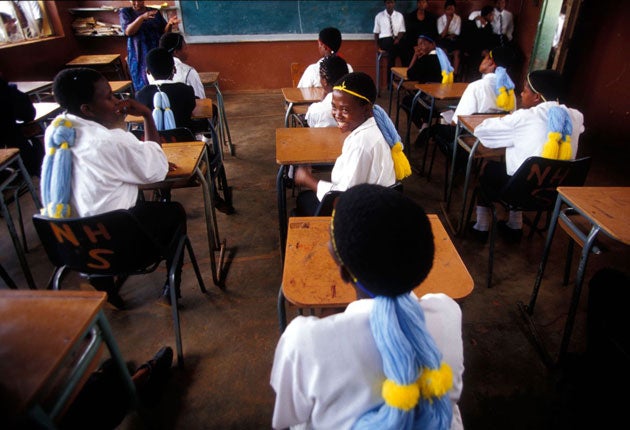Brown's pledge to give all children an education
Drive to tackle poverty heads G20 agenda in London next month

The world's richest countries are to set up an international crisis fund to help support the poorest nations through the global recession, Gordon Brown said yesterday.
He also promised a fresh drive against illiteracy in developing countries by ensuring all the world's children are offered some schooling.
The Prime Minister vowed that tackling poverty would be central to next month's G20 gathering in London of the leaders of the world's major economies. He told a development conference that the Government would draw up plans with other major economies and the World Bank to set money aside for developing nations hit by falling levels of investment and aid.
Mr Brown said: "This new fund will be targeted at the very poorest – helping to keep girls in school, keep food on the table and keep poverty from the door." The aim was to ensure that such countries are in a position to benefit equally when global recovery begins rather than face a "deepening cycle of poverty", he said. The Prime Minister called for a new international effort to provide a school place for every child in the world; some estimates suggest that 75 million children have never received any education.
He said that President Barack Obama, whom he met last week in Washington, also supported efforts towards universal schooling – an ambition described by Mr Brown as "the greatest legacy we could leave". British officials believe that George Bush's departure from the world stage will give fresh impetus to achieving that goal.
Anti-globalisation demonstrators are expected to target the G20 summit, protesting that the event is ignoring the plight of developing countries that have been severely affected by the financial crisis.
But Mr Brown argued yesterday at the Department for International Development Conference on eliminating world poverty that it was essential to involve every continent in drawing up an international recovery plan. "I want us all to affirm we cannot solve the economic challenges of globalisation without involving Africa and the developing countries," he said. "We cannot solve our global climate change challenges without involving Africa and the developing countries and we cannot solve our security challenges without involving Africa and the developing countries."
He also insisted that aid and development money had to remain "predictable" and promised that the G20 meeting would feature moves to crack down on tax havens that "siphon off" money from developing countries.
Mr Brown argued that the challenges of globalisation were bigger than those during the industrial revolution. And he warned that it would become "unsustainable" unless problems of financial instability, climate change, security and growing inequality were tackled. He warned that the poor could be driven into the arms of extremists in a "rebellion against modernity" unless such challenges were addressed.
Andrew Mitchell, the shadow International Development Secretary, said: "The global downturn is hitting developing countries hard. This is a time to reaffirm our commitment to the poorest people in the world, not abandon it."
The Prime Minister also told the conference that the major global institutions were in need of "fundamental reform" because they but they were designed for "previous times and different problems". He said that the International Monetary Fund did not have the constituition to act in a crisis and the World Bank has insufficient funds, and added: "We don't have an organisation that properly deals with the issue of the environment."
Join our commenting forum
Join thought-provoking conversations, follow other Independent readers and see their replies
Comments
Bookmark popover
Removed from bookmarks